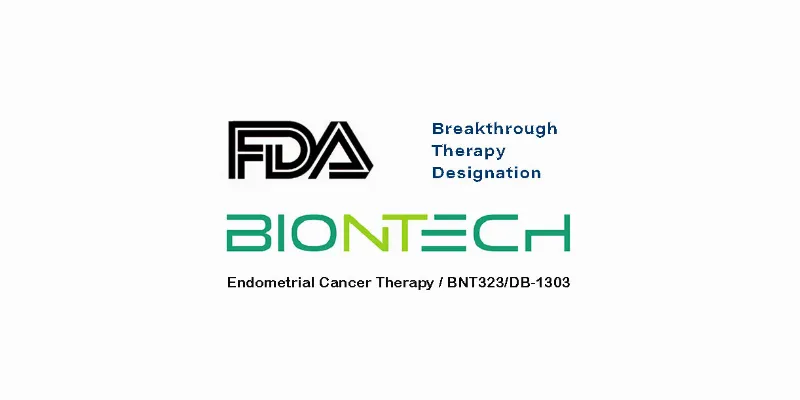BioNTech's Endometrial Cancer Drug Receives FDA Breakthrough Therapy Designation

22 December 2023
BioNTech and Duality Biologics announced that their next-generation endometrial cancer drug candidate received the FDA's Breakthrough Therapy designation. This crucial development, driven by positive Phase 1/2 study results, accelerates the drug's review process, offering hope to endometrial cancer patients.
The US Food and Drug Administration (FDA) has awarded Breakthrough Therapy designation to BNT323/DB-1303, a promising treatment for advanced endometrial cancer developed by BioNTech and Duality Biologics. This significant step, fueled by positive Phase 1/2 study results, aims to expedite development and review, addressing the urgent need for effective treatments in a disease that is the second most common gynecological cancer worldwide. BNT323/DB-1303 elicited an unconfirmed overall response rate of 58.8% and an unconfirmed disease control rate of 94.1% in 17 evaluable patients.
Evaluating this historical development, Prof. Özlem Türeci, Chief Medical Officer and Co-Founder at BioNTech, emphasizes her optimism, stating, “The Breakthrough Therapy designation for BNT323/DB-1303 shows the potential of our ADC candidate to address current treatment challenges for patients with advanced HER2-expressing endometrial cancer who progressed under several lines of systemic therapy. For these patients the survival rates are still low and the medical need for new and more effective treatments remains high. With the designation and support by the FDA, we seek to expedite further development of BNT323/DB-1303.”
The Promising Candidate: BNT323/DB-1303
New Endometrial Cancer Drug Candidate, BNT323/DB-1303 is an innovative antibody-drug conjugate (ADC) targeting Human Epidermal Growth Factor Receptor 2 (HER2), a protein found on the surface of certain cancer cells. This designation stems from encouraging data obtained from a Phase 1/2 study, indicating significant anti-tumor activity in patients with advanced HER2-expressing endometrial cancer.
Highlighting the importance of the FDA's decision, Dr. Vivian Gu, Chief Medical Officer at DualityBio, stated, “The FDA's decision is an important milestone in the development of our novel differentiated ADC candidate directed at HER2. The HER2 protein overexpression and/or gene amplification is present in approximately 17% to 38%6 of patients with endometrial cancer and more than 50%7 of patients in late disease stage exhibit HER2 overexpression. We believe BNT323/DB-1303 has the potential to serve as a new therapeutic option for patients.”
Endometrial Cancer: A Growing Concern
With over 400,000 new cases annually, endometrial or uterine cancer presents a significant global health challenge. The survival rates for advanced stages of this disease are alarmingly low, (18.4%5.) emphasizing the urgency for more effective treatments.
Impact of the Breakthrough Designation
The FDA's Breakthrough Therapy designation is not just a label; it's a pathway to accelerate the development and review of drugs intended for serious or life-threatening conditions. It is granted when preliminary clinical evidence suggests substantial improvement over existing therapies. For BNT323/DB-1303, this means more frequent FDA engagement and potential for priority review, speeding up its availability to patients in need.
The encouraging results from ongoing studies, including a 58.8% unconfirmed objective response rate, signal a beacon of hope for patients, especially those who have progressed after other treatments. BNT323/DB-1303, with its manageable safety and notable anti-tumor effects, stands as a potential breakthrough in cancer treatment. Currently, it is being evaluated in ongoing Phase 1/2 and pivotal Phase 3 studies for various advanced solid tumors and metastatic breast cancer.
About BNT323/DB-1303
BNT323/DB-1303, a third-generation topoisomerase-1 inhibitor-based antibody-drug conjugate (ADC) from DualityBio, targets HER2, a protein linked to aggressive cancer growth. Developed using DualityBio's DITAC platform, it has shown antitumor activity in various solid tumors, including breast, gastric, endometrial, and biliary tract cancers. It's effective against both HER2-positive and low-expression tumors and is currently in Phase 1/2 and Phase 3 studies for advanced and metastatic cancers, showing a manageable safety profile.











Comments
No Comments Yet!